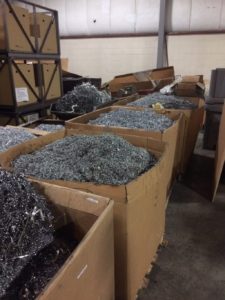Life in America certainly hasn’t been boring these last few years. It’s become hard to predict what the future has in store, and a lot of industries are a little unstable right now. Metal recycling is no exception.
 Consumers and businesses who drop off their scrap at the local recycler may notice the prices they’re paid for their old metal fluctuates over time. These customers, doing business with a local company, may not realize that metal recycling is a truly global industry. What happens with steel prices and tariffs in China can directly affect the scrap prices you’ll find in your own town. Trade policy touches everything.
Consumers and businesses who drop off their scrap at the local recycler may notice the prices they’re paid for their old metal fluctuates over time. These customers, doing business with a local company, may not realize that metal recycling is a truly global industry. What happens with steel prices and tariffs in China can directly affect the scrap prices you’ll find in your own town. Trade policy touches everything.
What’s Happening with Trade Policy
President Trump announced in March, 2018 that the U.S. would begin imposing steep tariffs on steel and aluminum imports. The move was intended to level the playing field for domestic metal producers. Now, steel importers must pay a 25 percent tariff and aluminum importers must pay 10 percent. The tariffs affect importers from most foreign countries including Mexico, Canada and the EU.
The U.S. Congressional Research Service estimated that the U.S. took in $1.1 billion and $344.2 million from tariffs on steel and aluminum, respectively, during the first five months of levies. In 2018, the CRS also estimated that steel and aluminum levies could generate $7.5 billion during 2019. (Although those are significant numbers, the president made headlines in October when he seemed to forget about his March orders, telling the Washington Post: “Where do we have tariffs? We don’t have tariffs anywhere.”)
However, the establishment of the tariffs set off a chain reaction that has had negative repercussions for some American businesses. Many countries announced their plans to impose tariffs on American products as retaliation for Trump’s levies on metals. Later in 2018, the Chinese government began imposing between 5 and 25 percent in additional tariffs on American products.
Both the import tariffs and China’s retaliatory tariffs have hit some American businesses hard. The CEO of Ford, for one, told news outlets in 2018 that the steel and aluminum tariffs would cost the company $1 billion in profits.
What That Means for Metal Recycling
The short answer to the question, “how will tariffs affect metal recycling going forward?” is this: we don’t know. Trade policy around this subject is very much up in the air and subject to change at any point. Just this past March 1st, the current administration decided at the last minute to halt a plan that would raise tariffs on Chinese imports from 10 percent to 25 percent.
Initially, metal recycling experts predicted the tariffs would mean good things for the domestic scrap industry. The hope was that restricting steel and aluminum imports would drive up domestic prices for these metals, which would in turn increase the price for scrap metal.
No industry-wide data conclusively tells us the total impact of the tariffs so far, but a lot of metal recycling companies have been struggling in recent months. Recyclers often sell their scrap to other countries. Now they’re struggling with retaliatory tariffs on American exports, which take a huge bite out of profits. Rising prices for steel and aluminum also raise operating costs for recyclers. The machinery, containers and equipment that our businesses require are made largely of these metals. Increased demand for domestic metals also means recyclers may have to wait longer to get new equipment and vehicles. Ultimately, higher operating costs must be passed onto customers.
What That Means for You
We’re hopeful that domestic steel and aluminum producers will flourish, and we plan to continue to pay competitive rates for scrap. However, it’s impossible to predict exactly what U.S. and international trade policies have in store for the metal recycling industry in the next few years. The team at Miller Recycling will be watching closely as developments unfold, and we’ll let you know if anything dramatically shifts the metal recycling landscape.
In the meantime, we’d love to talk to you about all your recycling needs. Contact Miller Recycling to learn more.

